Now the Whittington faces ‘ruthless cuts’
After 2010 campaign to save A&E, details emerge of proposals that could cause chaos for hospital services
Friday, 23rd May 2025 — By Tom Foot
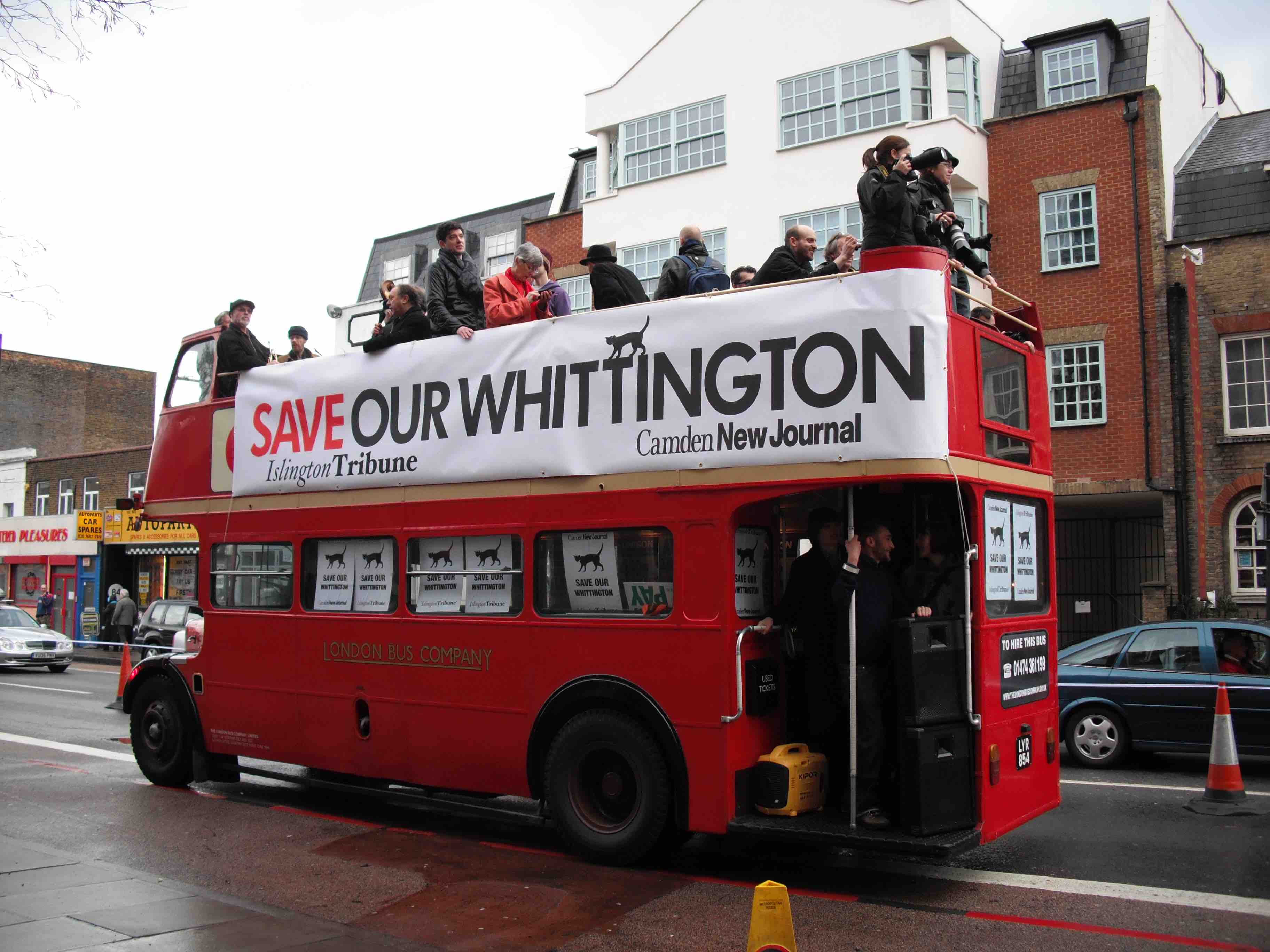
The Tribune’s battle bus hit the road to back the campaign to save under-threat departments at the Whittington in 2010
ONE of north London’s most successful campaign groups is getting the band together after worrying details of “ruthless cuts” began to leak out from behind closed doors.
The Defend Whittington Hospital Coalition is reforming after a four-year hiatus due to the latest NHS emergency.
It comes as staff, union reps and hospital insiders warn that unprecedented savings – yet to be officially unveiled – are set to cause chaos in the north London health service and directly impact “staff, clinicians, bodies on the ground”.
The Whittington has already ordered a recruitment freeze after it was ordered to slash annual spending by £27million – more than double what it was forced to save last year.
At UCH, 200 nursing staff posts are threatened with the axe in a move that will heap pressure on already burnt-out front-line staff.
Meanwhile, the North Central London Integrated Care Boards (ICB) – a strategic partnership that plays a key role in how funding is divided between 10 hospitals, 180 GP surgeries, 300 pharmacies and 200 care homes – is having its funding literally slashed in half.
At a public meeting in Archway Methodist Church on Thursday, DWHC’s former chairwoman Shirley Franklin said: “We have been getting very anxious recently about the privatisation agenda of the government. But since then we have heard about a massive cuts agenda across the country. We don’t think people know what is going on in the NHS.”
The Tribune reported how there was not a dry eye in the house in 2021 when the DWHC held its “last ever” meeting on Zoom, when the group “bowed out undefeated”.
On Thursday the DWHC relaunched at the Archway Methodist Church where it was first formed in 2009 by a group of mainly women, including campaign stalwarts Ms Franklin, Candy Udwin and Jem Lindon.
It was the same venue that hosted packed public meetings in 2010 ahead of a huge march along Holloway Road when the Whittington’s A&E and maternity unit was threatened with closure.
The DWHC also staged a second successful campaign and demonstration when a massive land sale and bed closure proposal was floated in 2013.
The DWHC then mobilised a successful campaign to stop the Whittington joining forces with Rydon – the company implicated in the Grenfell disaster – in 2017.

Shirley Franklin, Martin Franklin and Valerie Lipman at the Archway Methodist Church meeting
Without the group drawing attention to decisions, often hatched behind closed doors, politicians, the press and people power campaigners could never have won the day.
MP Jeremy Corbyn – another founding member of the DWHC – said: “The DWHC was set up for very a important reason: to defend the Whit when the A&E was under threat. That brilliant and successful campaign kept the A&E open, and also the whole hospital open. Every time I look at the annual statistics – that hover between 90-110,000 patients a year – I think we did very good work then.”
The Whittington’s communication director attempted to put a positive spin on the coming storm of “efficiencies” as he stood up at the lectern and told the meeting the hospital would get through the “worrying time”. Andrew Sharratt said the hospital was used to making “difficult decisions” to save money each year, adding that in the last financial year, 20 per cent was slashed from the NHS trust’s agency staff spend – as it made £13m of cuts to balance its books. “We do not yet have a plan to deliver a balanced budget this year. There isn’t a secret plan,” he added.
“There are going to be efficiency savings. But we have been here before. It is a worrying time. There will be difficult decisions. There’s lots to do. We need to make these plans. We will attempt to do that in partnership with you.”
This week the North Central London Integrated Care Board met to discuss its “50 per cent operating cost reduction” and what it described as “a period of major national transition”. A blueprint provides detail on how functions will be transferred from the ICBs to the organisations that provide the service.
Frances O’Callaghan, NCL ICB chief executive, said: “We support the need for the NHS to make changes, however, they are hugely challenging.
“We will need to think and work differently with our partners in the NHS, local councils and the voluntary and community sector, to change and improve the way we design, pay for, and deliver health and care services, ensuring that the money we spend is done so strategically, and in a targeted way, to deliver the very best possible care and services for local people.”
A Department of Health and Social Care spokesperson said: “This government has invested £26bn into our NHS. Investment must go hand in hand with reform, which is why we are cutting red tape by halving the number of national targets and empowering local leaders to focus on delivering for patients.”
NURSE: ‘Marketisation of the NHS is horrible to see’
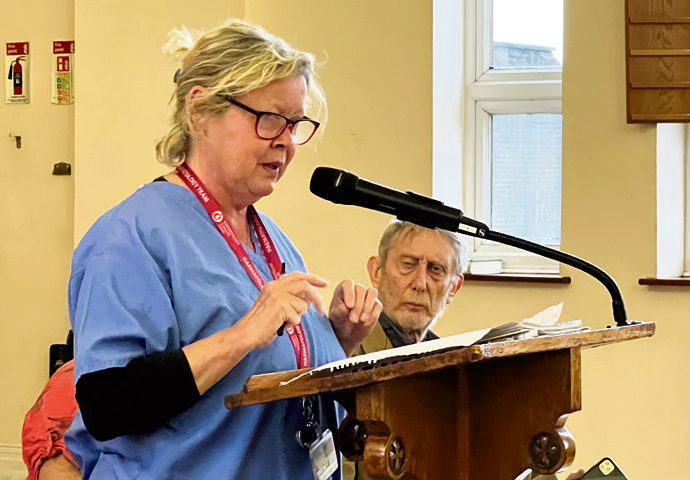
A NURSE with decades of experience on the NHS frontline said she would no longer recommend her profession to young people including her own children.
Janet Maiden (pictured), who works on the haematology ward at University College Hospital, blamed the “horrible marketisation” of the health service and the Labour government that is “worse than Tory-lite”.
She warned of plunging morale with whispers on the corridors that up to 200 nursing posts could be axed at the Euston Road hospital.
Speaking in a personal capacity, the hospital’s Unison branch chair said: “My life in the NHS has by and large been a really happy experience. It’s a job I’ve loved, but only when given the time to do it and with enough pay.
“Probably up until five to 10 years ago it is something I would have recommended to young people – my own children. But that has changed.
“It’s horrible experiencing the aspects of marketisation of our NHS. The problem is that so many people are employed to look at the numbers we need. We have to tick this box, tick that box, prove we are giving safe care. But then there is a whole generation of nurses who aren’t taught what giving care actually is.
“Life on the wards is getting harder and harder. People used to fight over extra shifts when they were posted in the WhatsApp group. Now we put up a shift and no one wants it. People are burnt out – they need the money, but they don’t want the shift. That is shocking to me.”
Ms Maiden said she believed there were alternatives to cutting staff, adding: “We have heard this week – and it is not official yet – of them talking about up to 200 posts going. My question is, why don’t they look at the assets, and bringing staff back in house, instead of telling us the people we can do without?”
She added: “People quite rightly welcomed the Labour government 10 months ago, but horrendously they are offering us worse than Tory lite. It was supposed to be a given that the NHS was safe in hands of Keir Starmer and Wes Streeting. But now it is something that we have to have big, big meetings about.
“We do need to all come together and take confidence from the strikes that are happening now.
“Look at the bins in Birmingham. We need to see a bit more of that on the NHS. We can’t afford to take all these government plans lying down.”
MP: ‘US firms want access to the NHS’
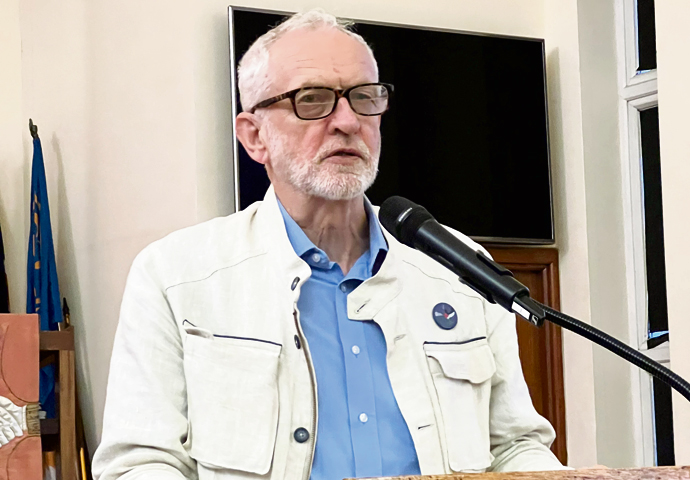
JEREMY Corbyn (above) said he was keeping a watchful eye on the UK government’s trade dealings with Donald Trump’s United States.
The independent MP for Islington North said he was concerned that a deal could fully open up the NHS to American healthcare companies.
US firms currently are not allowed to directly bid for NHS contracts, but have in recent years tested the water through subsidiaries based in the UK and Europe.
There have also been several takeovers by private equity companies in a wide range of health services including ambulance services, diagnostics, community care, complex care, and dentistry.
Mr Corbyn said: “What I am concerned about is the demands by US healthcare companies on Donald Trump for access to NHS services, and the amount of lobbying that is being done by the private healthcare sector on all political parties. We’ve got important work to do.”
He spoke about a black hole in democratic accountability in the NHS since the collapse of public health councils that had elected members sitting on them.
He slammed prime minister Sir Keir Starmer for his “abominable” attack on migrant workers, adding: “I just feel this week more angry than I have felt for a very long time. I’ve heard the PM repeating what Enoch Powell said in 1968 in his ‘rivers of blood’ speech, in this case ‘an island of strangers’.
“What does that say to people who give their lives to our national health service, our transport, the education service and are part and parcel of our community? It is disgusting language that should never have been uttered. We are a community of people.”
Ex-union chief: ‘Cuts will have a major impact on care’
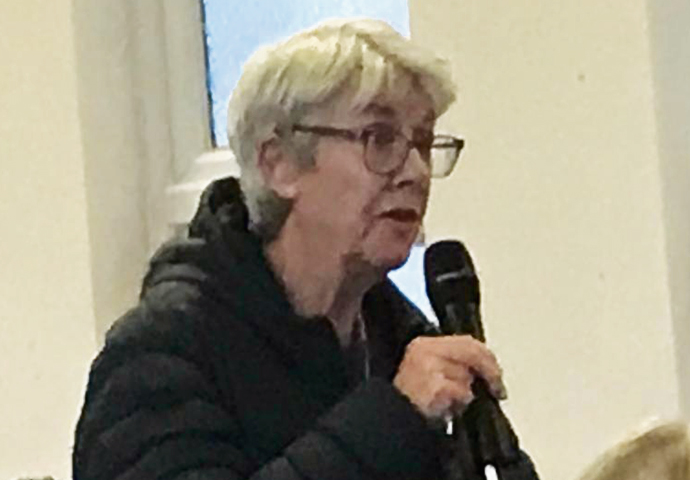
A FORMER Unison branch chief at the Whittington warned that staff are being asked to “collude” in “ruthless cuts” as she called on unions to “get off their backsides” and fight back.
Claire Dixon revealed the Highgate hospital had been ordered to freeze recruitment as it scrambles to wipe £27million off its annual spending just to balance its books.
For context, the cuts the hospital’s board was ordered to approve last year were around £13million.
Ms Dixon read from a letter recently sent out to staff in the hospital: “All staff are encouraged to contribute to efficiency cost plans including the identification and delivery of cost improvement plans. The trust will be implementing a recruitment pause for two weeks to see if any posts should be withdrawn either on a permanent or temporary basis. We need to harness ideas from our staff to improve productivity. We are aiming to save £27m.”
Ms Dixon said: “I think it is cruel and wrong that staff should be colluding with such plans. we know this level of efficiencies, generated by a so-called Labour government, should never be in existence in the first place. Staff should not be pressurised to do that, they should be mobilised to oppose such cuts. We’ve been here before, but these are phenomenal figures. And this is going on around the country. We know darn well, £27m means ruthless cuts: staff, clinicians, bodies on the ground. That will have a major impact on patient care.”
Ms Dixon said the trade unions needed to show “a bit more backbone”, adding: “We need to drive the message home to our trade union leaders to get off your backside and do something about this.”
Ms Dixon spoke about plunging moral among the lower paid NHS workforce. “People are being paid £13-something an hour. You get a sandwich over the road from the hospital and you are being asked for £9 for a ciabatta and a coffee. That’s what NHS workers are worth.”
Recent staff survey results published this week show that numbers of staff to have experienced “harassment, bullying or abuse” from colleagues or patients remain around one in four.
Ms Dixon said that a monster 50 per cent cut to the North Central London Integrated Care Service – a body of NHS employees who decide how funding is spent in north London – would cause chaos for patients and staff.
“They are going to slash this big baby they created a few years ago – by 50 per cent. That’s vaccinations, blood pressure checks, smoking cessation services, diagnostic centres. Human resources – staff who are bullied and vilified, they need those people. We need to wake up and organise a major fightback before it’s too late.”
A People’s Assembly against Austerity march between Portland Place and Whitehall has been called for June 7.
POET: ‘They see social sector as a burden because there’s no profit’
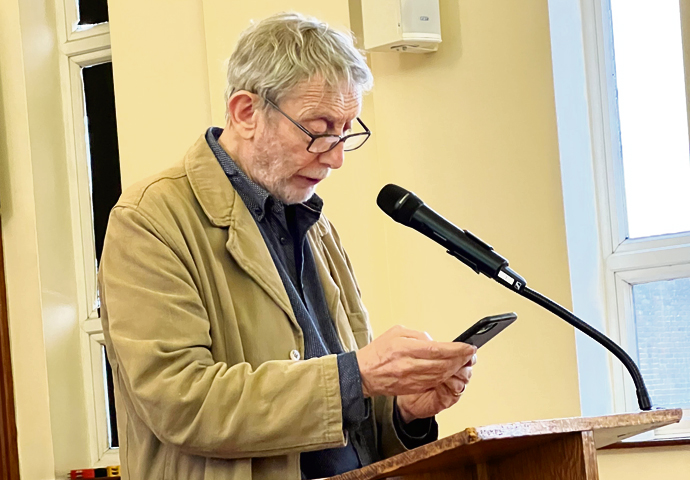
MICHAEL Rosen read a poem written in response to Sir Keir Starmer’s anti-immigrant rhetoric as he praised the Whittington for saving his life.
The popular children’s author explained how health workers from a range of nationalities expertly cared for him in the Highgate hospital over several months in the height of the Covid pandemic.
He spoke about the priorities of the government that saw the NHS as a financial burden rather than a support network for people.
He said: “Why are we even talking about cuts? It is because of priorities and the way this government and the previous two think about the social sector as a burden, a burden on business.
“They see it as a burden because it is not making a profit – in their terms it is somehow costing the country. But you would only think like that if you somehow ignore people. That’s why they use the word ‘economy’. You would think there are no people in the ‘economy’. But in fact the economy is us, the people. The social sector – education, health, social services and so on – it is all us.”
Mr Rosen spoke about the Michelle Mone PPE scandal and how “millions if not billions” of pounds were routinely disappearing into the pockets of private enterprise.
He said: “And they are saying in actual fact it would be better if business would handle the NHS.
“I’m here because the Whittington saved my life. The people who cared for me, I’ve met some of them since, and they are still recovering, it was such a traumatic time.
“This was a terrifying time and the government was not prepared. But in the NHS, the top priority was the patient.”
• You can watch Mr Rosen recite his poem on our politics channel on YouTube, Peeps. See https://www.youtube.com/@PeepsOnline